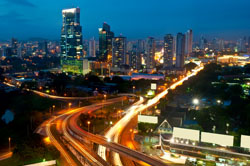Rethinking Panama
Thursday, October 13, 2011

Panama has changed. So should American attitudes
Nearly four years after the United States negotiated a Free Trade Agreement with Panama, Washington should ratify a treaty, which creates opportunities for American producers, and strengthens a strategic partnership in the region.
Meanwhile, Panama’s success in cleaning up its banking practices and tax rules, means that there is no longer any major moral objection to completing the deal.
As far as business opportunities are concerned, Panama may have a small economy, but it thinks big.
During the past three years, a bad time for most of the world’s economies, Panamanian output grew by a healthy 5% annually on average.
In the previous five-year period, Panama had the fastest growth of any Latin American country, with the real value of national production increasing by an average of more than 9% annually.
Even more important, Panama is a country with a plan.
Its goal is to become the world’s third great logistics center, after Hong Kong and Singapore, by focusing on three pillars – advanced logistics, a unique commercial center, and a strong banking system.
A new, $5.3 billion canal, scheduled for completion in 2014, will allow passage of most of the new generation of container ships
As a result, Panama will for at least several decades continue being part of the main sea route between Asia and North America's east coast.
Two modern super-ports, one operated by Danish shipping giant Maersk, and the other by Hong Kong-based Hutchison Whampoa, are already in place to serve canal operations.
Meanwhile, Panama City’s Tocumen International has more connections to South America and the Caribbean than any other airport in the hemisphere.
Infrastructure for ordinary Panamanians is also growing impressively.
Last month, Panama City started work on a $1.5 billion metro, Central America’s first, and announced plans for three additional lines.
Another component of national development involves vast warehouse facilities on the Caribbean coast, an hour from the capital, to which wholesalers from all over Latin America come to buy Asian products at competitive prices, without the expense and trouble of going to Asia.
As far as banking is concerned, investors from unstable countries throughout the hemisphere have for decades relied on Panama’s financial system, as a secure haven for their savings.
To achieve its goal, Panama needs to deal with several serious challenges.
Too many Panamanians are uneducated and unskilled.
Panama has the third-highest gap between rich and poor of all Latin American countries, and 40% of the population earns $10 or less per day.
On the other hand, the administration of current President Ricardo Martinelli plans to spend close to half of its proposed $14 billion budget over the period 2010-2014, on services related to education, health, housing, and social welfare.
At the same time, Panama is shedding its reputation as a haven for drug traffickers, who want to launder money, and for residents of other countries, who seek to evade domestic tax obligations.
Between 2010 and the end of this year, Panama will have entered into tax treaties with close to 20 countries.
Under any of these agreements, a country which presents evidence of evasion can get information about accounts in Panama, directly or indirectly owned by its taxpayers.
For their part, Panamanian financial institutions have adopted international standards, which make it hard to move illicit funds through local bank accounts.
A free trade deal would not move American jobs to Panama, a country with a weak manufacturing sector.
Since Panama has a small agricultural sector, and makes few goods, American producers have excellent opportunities in the Panamanian market, in areas that include rice, wheat, beef, pork, processed and frozen foods, and industrial equipment and machinery, including motor vehicles.
They would have better access to the Panamanian market, if the free trade agreement came into force.
For its part, the United States would strengthen its ties with a country of great strategic importance in the region.
Panama has in recent years reinvented itself.
It’s time for the United States to rethink its approach to Panama.
Fred Blaser
Chairman
Republica Media Group
